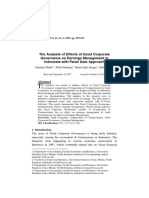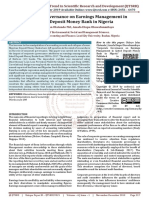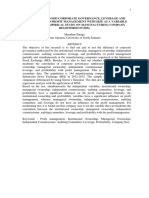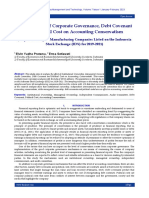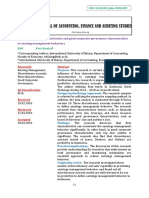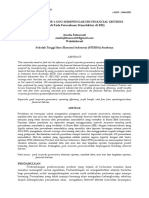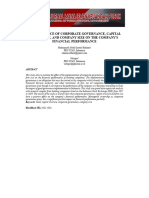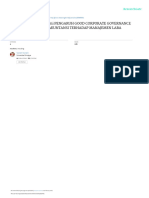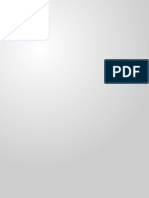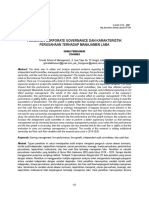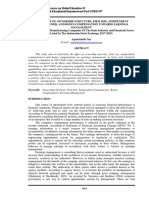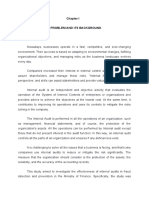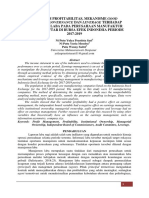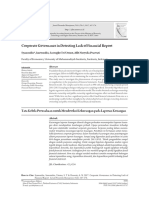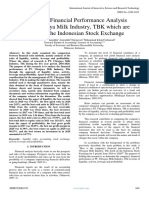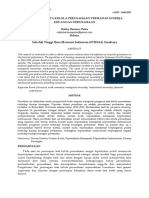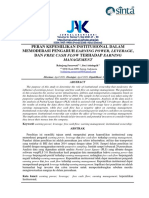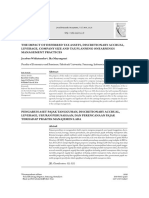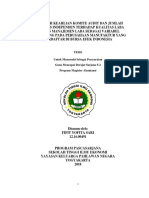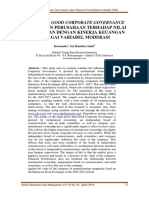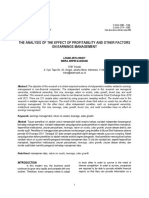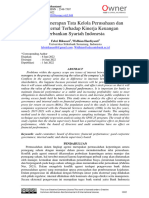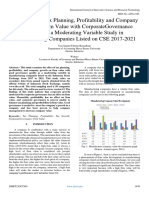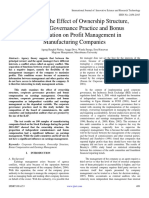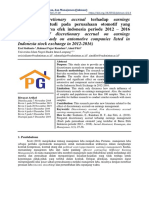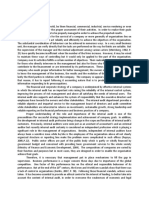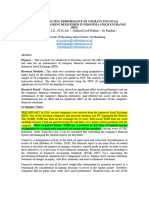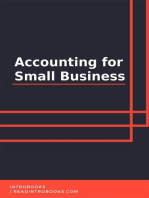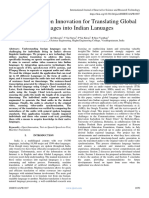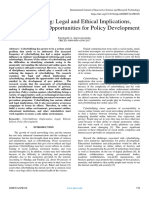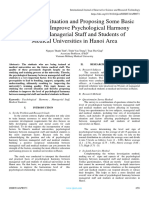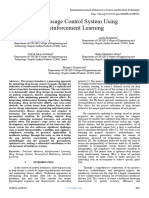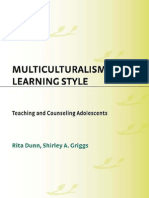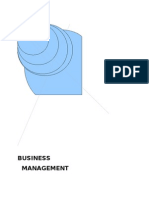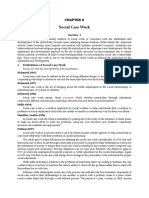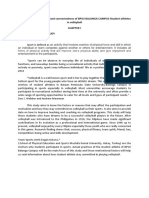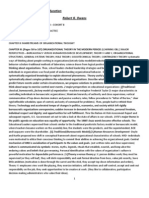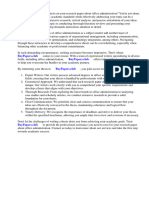Professional Documents
Culture Documents
The Effect of Stock Ownership, Independent Board of Commisioners and Characteristics of The Audit Committee On Creative Accounting Practices
Original Title
Copyright
Available Formats
Share this document
Did you find this document useful?
Is this content inappropriate?
Report this DocumentCopyright:
Available Formats
The Effect of Stock Ownership, Independent Board of Commisioners and Characteristics of The Audit Committee On Creative Accounting Practices
Copyright:
Available Formats
Volume 7, Issue 11, November – 2022 International Journal of Innovative Science and Research Technology
ISSN No:-2456-2165
The Effect of Stock Ownership, Independent Board of
Commisioners and Characteristics of the Audit
Committee on Creative Accounting Practices
Nadhiyah Putri Wahdana Abdul Hamid Habbe Ratna Ayu Damayanti
Accounting Department Accounting Department Accounting Department
Hasanuddin University Hasanuddin University Hasanuddin University
Makassar, Indonesia Makassar, Indonesia Makassar, Indonesia
Abstract:- This study aims to analyze the effect of stock accountability, so that the good and bad performance of
ownership, independent board of commissioners and management is measured by the amount of profit achieved by
characteristics of the audit committee on creative the enterprise. If the enterprise's financial performance is
accounting practices. The object of this research is a state- considered less profitable so that it does not match
owned company listed on the Indonesia Stock Exchange expectation, then the management will tend to manage its
for the 2016-2020 period. A total of 90 companies became financial statements so it can impress the investor. This is what
the research sample which were tested using purposive triggers the management team to implement Creative
sampling method. Based on the results of the multiple Accounting.
regression analysis conducted, it can be concluded that
managerial ownership has a negative effect on creative According to Bhasin (2016), Creative Accounting is a
accounting practices. The expertise of the audit committee practice that follows (or may not) follow accounting principles
has a positive effect on creative accounting practices. or standards, but deviates from the real goal in order to show
Institutional ownership, independent board of the image desired by the enterprise to stakeholders. The term
commissioners, audit committee activity and audit can be equated with disclosure management in terms of
committee independence have no effect on creative intervention in the financial statements process (Schipper,
accounting practices. The implications of the results of this 1989). The emergence of Creative Accounting practices is
study is for accountants to be wiser in making decisions caused by market pressure on business entities to be able to
that are beneficial to stakeholders. meet profit targets as expected by the market. This market
pressure has an impact on the income generation for the
Keywords:- Stock Ownership, Independent Board of management, so the manager decides to carry out earnings
Commissioners, Characteristics of the Audit Committee, and management in influencing the profit figure which results in a
Creative Accounting Practices. decrease in the quality of financial statements. Watts &
Zimmerman (1986) in their book on positive accounting
I. INTRODUCTION theory propose three hypotheses of earnings management
motivation, namely: (1) the bonus plan hypothesis, (2) the debt
Financial statement is a medium describing how the covenant hypothesis, and (3) the political cost hypothesis.
enterprise's financial performance is the basis for internal and However, other studies have found evidence that earnings
external parties in making better decisions in the future. In management can be limited by good corporate governance
preparing financial statements, an accountant in Indonesia (Klein, 2002; Dechow, 1996; Beasley, 1996).
must follow the Generally Accepted Accounting Principles
(Jaelani, 2014: 1). The purpose of the establishment of According to Indonesian Institute for Corporate
Generally Accepted Accounting Principles is as a standard that Governance (IICG), corporate governance is a series of
synchronizes the financial statements of an entity in a country mechanisms that direct and control a enterprise so that the
that produces financial statements, making it easier for the enterprise's operations run in accordance with the expectations
reporting process to be known as an audit. In addition, this of stakeholders who apply the principles of transparency,
principle also provides flexibility for practicing accountants in accountability, responsibility, independence, and fairness. The
a business entity to choose the accounting method used in classification of good corporate governance mechanisms
preparing financial statements. However, in practice, this according to Lins & Warnock (2004) is divided into two
accounting standard has limitations that can cause the groups, namely internal mechanisms and external
enterprise's management to carry out Creative Accounting mechanisms.
practice activities on its financial statements, making financial
statements less reliable. The method for controlling the enterprise by using an
external mechanism is the existence of institutional ownership.
Every enterprise has expectation of obtaining high and Institutional investor is considered capable of being an
stable profits because in the Statement of Financial effective monitoring mechanism in every decision taken by
Accounting Concept No. 1 states that profit is one of the main managers. According to Bernandhi (2013), institutional
indicators for measuring performance and management ownership is ownership of a enterprise's shares by institutions
IJISRT22NOV425 www.ijisrt.com 584
Volume 7, Issue 11, November – 2022 International Journal of Innovative Science and Research Technology
ISSN No:-2456-2165
or institutions such as insurance enterprises, banks, investment motivation and political cost motivation (Watts &
enterprises and other institutional ownership. A high Zimmerman, 1986).
institutional level will lead to greater supervisory efforts by
institutional investors so that they can hold self-interested B. Agency Theory
ownership behavior which will ultimately harm the One of the triggering factors for conflict of interest
enterprise's owners. Meanwhile, the method for controlling the according to Jensen & Meckling (1976) is the separation of the
enterprise is by using internal mechanisms such as the General ownership and control functions of the enterprise, so that this
Meeting of Shareholders (GMS), namely the existence of can lead to agency costs. The emergence of earnings
managerial ownership and an independent board of management as a result of Creative Accounting practices
commissioners. Managerial ownership provides an occurs when the agent as the manager of the enterprise knows
opportunity for managers who are involved in share ownership more about internal information about the enterprise's
so that their involvement are equal to shareholders. Managers prospects in the future than the owners (shareholders). The
are not merely external parties who are paid for the benefit of imbalance in the mastery of information will trigger the
the enterprise but are treated as shareholders. Therefore, it is emergence of a condition called information asymmetry,
expected that the involvement of managers in ownership can which is a condition caused by the unequal distribution of
be effective in improving the performance of managers. The information between the principal and the agent (Anggraeni,
internal control process is also carried out with the inclusion 2011). The principal is motivated to prosper himself with ever-
of a board of commissioners from outside the enterprise that increasing profitability, while the agent is motivated to
can increase the effectiveness of the board in supervising maximize the fulfillment of his economic and psychological
management to prevent the fraud of financial statements needs. Thus, there are two different interests in the enterprise
(Beasley, 1996). where each party, namely the principal and agent, seeks to
achieve or maintain the desired level of prosperity as stated by
Creative Accounting practices in a enterprise arise Setyantomo (2011).
because of a conflict of interest between shareholders
(principals) and managers (agents). Agency theory (Jensen & C. Institutional Ownership
Meckling, 1976) is often used to explain accounting fraud in Institutional ownership is part of the enterprise's shares
financial statements. Agency problems occur when the owned by institutions or institutions (insurance enterprises,
principal finds it difficult to trace what the agent actually does. banks, investment enterprises, and other institutional
Therefore, it takes an independent party who is considered ownership). The existence of institutional ownership is
capable as a mediator of interests between the principal and thought to be able to provide a supervisory mechanism that
the agent in managing finances, namely the Auditor. The audit aims to align various interests in the enterprise because they
committee is considered a liaison between shareholders and are considered sophisticated investors with a significant
the board of commissioners and management in dealing with amount of ownership that can monitor management which has
control issues. Thus, audit committee members are expected an impact on reducing managers' motivation to perform
to be able to understand the complexity of financial earnings management (Mahariana and Ramantha, 2014).
statements, evaluate accounting policies, understand auditor
decisions, and assess the quality of financial statements D. Managerial Ownership
(Kalbers & Fogarty 1993). Jensen & Warner (1988) stated that managerial
ownership can balance the interests of shareholders with the
Based on the description above, researchers are interests of enterprise management because management can
interested to test these variables by focusing on the study, directly feel the benefits that will be obtained and will bear the
entitled "The effect of stock ownership, independent board of risks for the decisions taken. Thus this is expected to motivate
commissioners and characteristics of the audit committee on the management to improve its performance. The management
Creative Accounting practices (Case studies on state-owned is the manager of the enterprise, such as directors, managers,
enterprises listed on the Indonesia Stock Exchange in 2016- and employees (Boediono, 2005).
2020)".
E. Independent Board of Commissioners
II. LITERATURE REVIEW AND HYPOTHESES According to the Forum for Corporate Governance
DEVELOPMENT (FCGI) (2001) that the board of commissioners is the core of
corporate governance, which is tasked with ensuring the
A. Positive Accounting Theory implementation of corporate strategy, supervising
From an economic perspective, positive accounting management in managing the enterprise and requiring
theory assumes that managers will rationally choose accountability. The existence of independent commissioners
accounting policies that they think good (Aryani, 2011). This has an important role in terms of monitoring the running of the
theory also explains that Creative Accounting is influenced by enterprise by ensuring that managers have implemented the
an economic framework that aims for self-interest. There are practices of transparency, accountability, independence of
various motivations suspected to underlie and encourage a disclosure, and fairness in accordance with the applicable
manager to behave opportunistically. Positive accounting regulations in the enterprise.
theory has three hypotheses that are used as the basis for the
main motivation for managers to practice Creative
Accounting, namely bonus motivation, debt contract F. Characteristics of the Audit Committee
IJISRT22NOV425 www.ijisrt.com 585
Volume 7, Issue 11, November – 2022 International Journal of Innovative Science and Research Technology
ISSN No:-2456-2165
The audit committee plays an important role in agency costs (Saffudin, AZ, & Prasetiono, P. (2011)). Based
overseeing the operations and the enterprise's internal control on this, the hypothesis that can be proposed is:
system with the aim of contributing to the development of the H2: Institutional Ownership has a negative effect on Creative
enterprise's strategic plan and is expected to provide input and Accounting practices.
recommendations to the board of directors with regard to any
financial or operational issues. Therefore, an effective audit The role of directors and commissioners is very
committee will focus on improving the enterprise's important and quite decisive for the successful implementation
performance and competitiveness, especially in a changing of corporate governance (Effendi, 2016). Based on agency
business environment that is beyond the enterprise's control theory, the existence of a supervisory board by the board of
(Charan, 1998; Craven & Wallace, 2001). There are several commissioners will increase the belief that management has
characteristics of the audit committee, including (1) the acted in the interests of the shareholders because the board of
activity of the audit committee, the more frequency of audit commissioners is appointed by the shareholders so they must
committee meetings with management, it is also expected that represent the interests of the shareholders in overseeing the
the potential for Creative Accounting practices in the actions of management. Based on this, the hypothesis that can
enterprise will decrease, (2) the expertise of the audit be proposed is:
committee, expertise in finance and auditing is considered H3: Independent Board of Commissioners has a negative effect
important for the effectiveness of the audit committee because on Creative Accounting practices.
in its assignment the audit committee really needs expertise in
the field of accounting/finance which is very good (Zaman, et. The implementation of good corporate governance will
al. 2011), and (3) the independence of the audit committee, the be more complete and effective with the activeness of the audit
existence of independence on audit committee can increase committee in holding meetings. The frequency of audit
investor confidence in the report enterprise finances and committee meetings is at least 4 times a year. The higher the
reduce the risk of Creative Accounting practices. frequency of meetings held by management, the effectiveness
of the audit committee in supervising management will
G. Creative Accounting increase in order to minimize Creative Accounting practices.
According to Khatri (2015), Creative Accounting Based on this, the hypothesis that can be proposed is:
practically uses the flexibility provided in accounting H4: The activity of the audit committee has a negative effect on
principles or accounting standards to manage different Creative Accounting practices.
accounting recognition, measurement and presentation to
serve the purposes of those who prepare accounts Dwiharyadi, A. (2017) revealed that accounting expertise
(management) than those who tend to use accounts (external focuses on the process of preparing financial statements to
parties, shareholders, creditors). The various motivations and produce information that describes the enterprise's financial
goals of management in implementing Creative Accounting condition, while financial expertise focuses more on financial
practices. Therefore, positive accounting theory management for enterprise operational activities. Thus, the
accommodates the use of this practice by referring to generally audit committee tasked with supervising in order to reduce
accepted accounting principles as legal standards used. Creative Accounting practices, requires accounting expertise
because the preparation of financial statements is closely
H. Hypothesis related to expertise in understanding the accounting cycle.
Extensive managerial ownership in the enterprise will be Based on this, the hypothesis that can be proposed is:
effective in supervising the activities of the enterprise Pujiati, H5: The expertise of the audit committee has a negative effect
D., & Widanar, E. (2009). This is in line with Wardani (2011) on Creative Accounting practices.
who said that increasing managerial ownership in the
enterprise encourages managers to create optimal enterprise The present of an independence of audit committee is
performance and motivates managers to act carefully because able to optimize the reputation of the audit committee as a
they share the consequences for their actions. This means that good supervisor, able to provide a more objective opinion and
an increase in share ownership by managers in the enterprise better able to provide recommendations in relation to the
will be able to create optimal enterprise performance and policies set and carried out by management (Rahmat &
motivate managers to act to be more careful, because they Iskandar, 2009). The independence that is always maintained
share the consequences of every action they take. Based on on the audit committee will increase investor confidence in the
this, the hypothesis that can be proposed is: financial statements and can reduce the possibility of the
H1: Managerial ownership has a negative effect on Creative enterprise being in a state of financial difficulty caused by
Accounting practices. cases of irregularities in corporate governance. Revitasari, et.
Al. (2017). Based on this, the hypothesis that can be proposed
Institutional investors have excel abilities in monitoring is:
Creative Accounting practices compared to individual H6: The independence of the audit committee has a negative
investors (Kholis, 2014). A high level of ownership by effect on Creative Accounting practices.
institutions in a enterprise will lead to greater oversight efforts
carried out by institutional investors so that they will be able III. RESEARCH METHODS
to control managers not to take actions that are not in line with
the interests of shareholders which will ultimately reduce This research explains the causal correlation among
variables through the submission of formulated hypotheses.
IJISRT22NOV425 www.ijisrt.com 586
Volume 7, Issue 11, November – 2022 International Journal of Innovative Science and Research Technology
ISSN No:-2456-2165
The variables in this study consist of independent variables standard deviation of 5.100001. The expertise of the Audit
(managerial ownership, institutional ownership, independent Committee (X5) has an average value of 3.644 with a standard
board of commissioners, audit committee activity, audit deviation of 0.128. The independence of the Audit Committee
committee expertise and audit committee independence) and (X6) has an average value of 0.3900 with a standard deviation
the dependent variable (Creative Accounting practices). This of 0.13825.
study uses secondary data with multiple linear regression
analysis method to test how far the relationship and the B. Multiple Linear Regressions
influence of independent variable on dependent variable. The The results of multiple linear regression testing can be
data was first analyzed using Microsoft Excel 2010, then seen in the following table:
testing was carried out using SPSS software (Statistical
Product and Service Solution) version 25. The data processing
process begins with the input of research variables into the
SPSS program and produces output according to the data
analysis method that has been determined. The object in this
study is a state-owned enterprise listed on the Indonesia Stock
Exchange from 2016 to 2020 which focuses on financial
statements and annual reports in the form of annual reports.
Based on criteria specified in the sample selection, the sample
enterprises used were 18 enterprises with an observation
period of 5 years so that the number of observations was 90
samples.
IV. RESULT
A. Descriptive Statistics Table 2. Multiple Linear Regressions
Descriptive statistics are used to determine the Source: Data processing, SPSS 25.0 version
description of a data. Descriptive statistical analysis is done by
looking at minimum value, maximum value, and mean value Based on the results of multiple linear regression test
and standard deviation of data. Based on the research data can above obtained the regression equation as follows:
be known descriptive analysis as follows:
Y = 0,006– 0,001 X1 - 0,056 X2+ 0,120 X3+0,003 X4 +0,226
X5- 0,015 X6
A constant of 0.006 indicates that if there are no
independent variables (i.e institutional ownership, managerial
ownership and independent board of commissioners, audit
committee activity, audit committee expertise and audit
committee independence) then the Creative Accounting level
(Y) of state-owned enterprises (BUMN) in 2016-2020 on the
Stock Exchange Indonesia is equal to 0.006.
The regression coefficient of the Proportion of
institutional ownership (X1), managerial ownership (X2) and
audit committee independence (X6) is negative which
indicates that there is a unidirectional change on Creative
Table 1. Descriptive Statistics Accounting practices. Meanwhile, the regression coefficient
Source: Data processing, SPSS 25.0 version of independent commissioners (X3), audit committee activity
(X4) and audit committee expertise (X5) are positive which
The number of samples in this study were 18 enterprises indicates that there is a directional change on Creative
with a total observation of 90 units of analysis (18 enterprises Accounting practices.
multiplied by 5 years of the research period). Creative
Accounting (y) has a minimum value of -0.01 and a maximum C. Hypothesis testing (Partial test)
value of 0.41 with a standard deviation of 0.11004. T – test statistic known as partial test, namely test to
Institutional ownership (X1) has a minimum value of 5.16 and know how influence each independent variable individually to
a maximum value of 99.55 with a standard deviation of dependent variable. The result of t Test Statistical if
23,95391. Managerial ownership (X2) has a minimum value probability value t 0,05 Ha is rejected.
of 0 and a maximum value of 1.17 with a standard deviation
of 0.18842 . The Independent Board of Commissioners (X3)
has a minimum value of 0.20 and a maximum value of 0.40
with a standard deviation of 0.07412. The activity of the Audit
Committee (X4) have an average value of 17.633 with a
IJISRT22NOV425 www.ijisrt.com 587
Volume 7, Issue 11, November – 2022 International Journal of Innovative Science and Research Technology
ISSN No:-2456-2165
D. F Test (Simultaneous)
F Test is a test to see how the influence of all independent
variables together on the dependent variable.
Table 4. Simultaneous Test
Table 3. Partial Test Source: Data processing, SPSS 25.0 version
Source: Data processing, SPSS 25.0 version
Hypothesis 7
Hypothesis 1 The count value of 2,567> F table with significance level
The count value of t equal to -0,001 with a significance is 0.025 which is smaller than α = 0.05, therefore the decision
value of 0.107>0,05, therefore the decision is H0 rejected. So, is Reject H0. So it can be concluded that there is influence
it can be concluded that there is a negative influence between jointly Institutional ownership (X1), managerial Ownership
institutional ownership (X1) and Creative Accounting practices (X2), independent board of commissioners (X3), the activity
(Y). of audit committee (X4), the expertise of audit committee (X5)
and the independence of audit committee (X6) on Creative
Hypothesis 2 Accounting (Y).
The count value of t equal to -0,056 with a significance
value of 0.031<0,05, therefore the decision is H0 accepted. So, E. Determination Coefficient Test
it can be concluded that there is a negative influence between The value of the determination coefficient can be
managerial ownership (X2) and Creative Accounting practices measured by the R-Square value when the independent
(Y). variable is only 1, or Adjusted R-Square is used when the
independent variable is more than two.
Hypothesis 3
The count value of t equal to 0,120 with a significance value
of 0.45>0,05, therefore the decision is H0 rejected. So, it can
be concluded that there is a positive influence between
independent board of commissioners (X3) and Creative
Accounting practices (Y).
Hypothesis 4
The count value of t equal to 0,003 with a significance value
of 0.235>0,05, therefore the decision is H0 rejected. So, it can
be concluded that there is a positive influence between the Table 5. R Square Test
activity of audit committee (X4) and Creative Accounting Source: Data processing, SPSS 25.0 version
practices (Y).
From the table above obtained coefficient of
Hypothesis 5 determination or Adjusted R Square valued at 0.457 or 45.7%
The count value of t equal to 0,226 with a significance means the variation of independent variables used in the model
value of 0.02<0,05, therefore the decision is H0 rejected. So, it of Proportion of institutional ownership (X1), managerial
can be concluded that there is a positive influence between the Ownership (X2), independent board of commissioners (X3),
expertise of audit committee (X5) and Creative Accounting the activity of audit committee (X4), the expertise of audit
practices (Y). committee (X5) and the independence of audit committee (X6)
are able to explain by 45.7% dependent variable that is Creative
Hypothesis 6 Accounting practices (Y), while the remaining 54.3%
The count value of t equal to -0,015 with a significance influenced by other factors outside the variables studied.
value of 0.866>0,05, therefore the decision is H0 rejected. So,
it can be concluded that there is a negative influence between
the independence of audit committee (X6) and Creative
Accounting practices (Y).
V. DISCUSSION
IJISRT22NOV425 www.ijisrt.com 588
Volume 7, Issue 11, November – 2022 International Journal of Innovative Science and Research Technology
ISSN No:-2456-2165
A. The Effect of Institutional Ownership on Creative The reason of the expertise of audit committee positively
Accounting Practices affects on Creative Accounting practices, according to
The reason of the institutional ownership negatively Dwiharyadi, A. (2017), the possibility of forming an audit
affects on Creative Accounting practices, according to committee in a enterprise with audit committee expertise that
Kristanti (2017), Institutional investors only carry out their has been assessed as good is only mandatory in order to meet
role as transient investors (temporary owners of enterprises) applicable regulatory standards without showing the actual
which only focus on short-term profits, so the institutional quality that the members have, so that it will not affect how
ownership is not necessarily able to improve monitoring effective the audit committee itself is. This research is in
effectively on management which will affect the reduction of accordance with research conducted by Hamzah, H., & Mu'id,
management policies in conducting earnings management. D. (2018).
This research is in accordance with research conducted by
Perdana, A. A. (2019) and Marsyah, S. R. (2020). F. The Effect of the Independence of Audit Committee on
Creative Accounting practices
B. The Effect of Managerial Ownership on Creative The reason of the independence of the audit committee
Accounting Practices negatively affects on Creative Accounting practices, according
The reason of the managerial ownership negatively to Core et al. (1991), the effectiveness of audit committee will
affects on Creative Accounting practices, according to decrease when its members work in many enterprises.
Kusumawardana, Y., & Haryanto, M. (2019), managerial Therefore, if the enterprise has an audit committee that has an
ownership will make management's position equal to that of important position in many enterprises, the enterprise's
enterprise owners who can align or unify the interests of management tends to carry out earnings management.
management and shareholders. Hence, management will act Independence is the most important characteristic that the
the same as investors in general and will carry out earnings audit committee must possess to fulfill its supervisory role.
management in order to know the real state of the enterprise. This research is in accordance with research conducted by
This indicates that managerial ownership can contribute to Aini, A. N. (2018).
controlling Creative Accounting practices. This research is in
accordance with research conducted by Gunarto, K., & VI. CONCLUSION
Riswandari, E. (2019) and Aeni, H. N., et. al (2019).
Based on the results of research and discussion in the
C. The Effect of Independent Board of Commissioners on previous chapter, here are the conclusion as follows:
Creative Accounting Practices The influence of institutional ownership, managerial
The reason of the independent board of commissioners ownership and committee interdependence audit partially
positively affects on Creative Accounting practices, according negatively affect on Creative Accounting practices.
to Puspitasari and Ernawati (2010), the Independent Board of The influence of independent board of commissioners,
Commissioners does not contribute to the improvement of committee activity and expertise audit partially has a
financial performance. The more commissioners coming from positive affect on Creative Accounting practices.
outside the enterprise resulted in less knowledge of the There is simultaneously influence of institutional
members of the Commissioners Board on the issues and ins ownership, managerial ownership, independent board of
and outs of the enterprise. This research is in accordance with commissioners, the activity of audit committee, the
research conducted by Aprillian, S. K., Pratomo, D., & expertise of audit committee, and the independence of
Asalam, A. G. (2021). audit committee on creative accounting practices.
D. The Effect of the Activity of audit committee on Creative REFERENCES
Accounting practices
The reason of the activity of audit committee positively [1] Aeni, H. N., Yudowati, S. P., & SE, M. (2019).
affects on Creative Accounting practices, according to “Pengaruh Asimetri Informasi, Leverage Dan
Widasari, T., & Isgiyarta, J. (2017), audit committees who are Kepemilikan Manajerial Terhadap Praktik Manajemen
proactive in holding periodic or routine meetings every year Laba.” E-Proseeding of Management, 6(2): 1886-1914.
do not have more opportunities to discuss financial statements [2] AINI, A. N. (2018). “Pengaruh Independensi Komite
issues and improving the results of the enterprise's supervision Audit, Keahlian Komite Audit, dan Jumlah Pertemuan
and control performance in detecting deviations from Komite Audit terhadap Manajemen Laba (Studi Empiris
accounting practices. This shows that the number of meeting Bank Konvensional di Indonesia yang Terdaftar di BEI
activities held by committee members in the form of audit tahun 2014-2016).” Doctoral dissertation: Universitas
committee meetings during the current period does not affect Muhammadiyah Purwokerto.
earnings management. This research is in accordance with [3] Anggraeni, Mariska Dewi. (2011). “Agency Theory
research conducted by Widiastuty, E. (2016). dalam Perspektif Islam.” Jurnal Hukum Islam, 9(2): 1-
13.
E. The Effect of the Expertise of Audit Committee on Creative
Accounting practices [4] Aprillian, S. K., Pratomo, D., & Asalam, A. G. (2021).
“Pengaruh Kualitas Audit, Kompensasi Bonus Dan
IJISRT22NOV425 www.ijisrt.com 589
Volume 7, Issue 11, November – 2022 International Journal of Innovative Science and Research Technology
ISSN No:-2456-2165
Dewan Komisaris Independen Terhadap Manajemen kreatif.” Skripsi S1. UDS. Semarang.
Laba (studi Kasus Pada Sektor Industri Barang [21] Jensen, M.C. and Meckling, W.H. (1976) . ”Theory of
Konsumsi Yang Terdaftar Di Bursa Efek Indonesia The Firm: Managerial Behavior, Agency Costs and
Periode 2015-2018).” eProceedings of Management, Ownership Structure”. Journal Of Financial Economics,
7(3). 3: 305-360.
[5] Aryani, Dwi Septa. (2011). “Manajemen Laba pada [22] Jensen, M. C., & Warner, J. B. (1988). “The distribution
Perusahaan Manufaktur di Bursa Efek Indonesia.” Jurnal of power among corporate managers, shareholders, and
Ekonomi dan Informasi Akuntansi (JENIUS), 1(2): 200- directors.” Journal of Financial Economics, 20: 3-24.
220. [23] Kalbers, L. P. and Fogarty, T. J. (1993) . “Audit
[6] Aryanti, I., & Kristanti, F. T. (2017). “Kepemilikan Committee Effectiveness; an Empirical Investigation of
institusional, kepemilikan manajerial, dan kualitas audit the Contribution of Power.” Auditing: A Journal of
terhadap manajemen laba.” Jurnal Riset Akuntansi Practice and Theory, 12: 24-49.
Kontemporer (JRAK), 9(2). [24] Khatri, Dhanesh Kumar. (2015) . “Creative Accounting
[7] Beasley, M. (1996). “An Empirical Analisis of The Leading to Financial ScamsEvidences from India and
Relation Between The Board of Director Compensation USA”. Journal of Accounting, Business & Management,
and Financial Statement Fraud.” The Accounting review, 22(2): 1-10.
71: 43-465. [25] Kholis, Nur. (2015). "Analisis struktur kepemilikan dan
[8] Bernandhi, Riza. (2013) . “Pengaruh Kepemilikan perannya terhadap praktik manajemen laba perusahaan."
Manajerial, Kepemilikan Institusional, Kebijakan Addin 8.1.
Dividen, Leverage dan Ukuran Perusahaan Terhadap [26] Klein, A. (2002) . “Audit Committee, Board of Director
Nilai Perusahaan.” Semarang: Universitas Diponegoro. Characteristics, and Earnings Management”. Journal of
[9] Bhasin, Madan Lal. (2016). “Survey of Creative Accounting and Economics, 33(3): 375-401.
Accounting Practices: An Empirical Study.” Wulfenia [27] Kusumawardana, Y., & Haryanto, M. (2019). “Analisis
Journal, 23 (1): 143–62. Pengaruh Ukuran Perusahaan, Laverage, Kepemilikan
[10] Boediono, G S. B. (2005) . “Kualitas Laba: Studi Institusional, Dan Kepemilikan Manajerial Terhadap
Pengaruh Mekanisme Corporate Governance dan Manajemen Laba.” Diponegoro Journal Of Management,
Dampak Manajemen Laba dengan Menggunakan 8(2), 148-158.
Analisa Jalur.” Simposium Nasional Akuntansi VIII, [28] Lins, Karl V. dan Francis E. Warnock. (2004)
Universitas Sebelas Maret, Surakarta. .”Corporate Governance and the Shareholder Base.”
[11] Charan, R. (1998). “How Corporate Boards Create International Finance Discussion Papers, Number 816.
Competitive Advantage.” Jossey-Bass, San Francisco, [29] Mahariana, I. D. G. P., & Ramantha, I. W. (2014).
CA. “Pengaruh kepemilikan manajerial dan kepemilikan
[12] Core, et. Al. (1999). "Corporate governance, chief institusional terhadap manajemen laba.” E-Jurnal
executive officer compensation, and firm performance." Akuntansi Universitas Udayana, 7(3): 688-699.
Journal of Financial Economics. 51: 371-406. [30] Perdana, A. A. (2019). “Pengaruh Kepemilikan
[13] Craven, K. S., & Wallace, W. A. (2001). “A framework Institusional, Leverage, dan Komite Audit Terhadap
for determining the influence of the corporate board of Manajemen Laba Pada Perusahaan Yang Terdaftar di PT
directors in accounting studies.” Corporate Governance, Bursa Efek Indonesia (Studi Empiris Pada Perusahaan
9(1): 2-23. Yang Terdaftar Di PT Bursa Efek Indonesia Dari Tahun
[14] Dechow, Patricia M., Richard G. Sloan, and Amy P 2015–2017).” Jurnal Ekonomi Sakti (JES), 8(1): 1-19.
Sweeney. (1996) . “Detecting Earnings Management”. [31] Pujiati, D., & Widanar, E. (2009). “Pengaruh struktur
The Accounting Review, 70(2): 193-225. kepemilikan terhadap nilai perusahaan: keputusan
[15] Dwiharyadi, A. (2017). “Pengaruh keahlian akuntansi keuangan sebagai variabel intervening.” Jurnal Ekonomi
dan keuangan komite audit dan dewan komisaris Bisnis & Akuntansi Ventura, 12(1): 71-86.
terhadap manajemen laba.” Jurnal Akuntansi dan [32] Puspitasari, Filia dan Endang Ernawati. (2010).
Keuangan Indonesia, 14(1): 75-93. Pengaruh Mekanisme Corporate Governance terhadap
[16] Effendi, Muh Arief. (2016) . “The Power of Good Kinerja Keuangan Badan Usaha. Jurnal Manajemen.
Corporate Governance.” Edisi Kedua. Jakarta: Salemba Teori dan Terapan, Tahun 3, No. 2, Agustus 2010.
Empat [33] Rahmat, M. M., Iskandar, T. M., & Saleh, N. M. (2009).
[17] FCGI. (2001). “Seri Tata Kelola Perusahaan (Corporate Audit committee characteristics in financially distressed
Governance)”. Jakarta. and non‐distressed companies. Managerial Auditing
[18] Gunarto, K., & Riswandari, E. (2019). “Pengaruh Journal.
Diversifikasi Operasi, Kepemilikan Manajerial, Komite [34] Revitasari, F. T., Nurdin, N., & Azib, A. (2017). “The
Audit Dan Kualitas Audit Terhadap Manajemen Laba.” Effect of Audit Committee Characteristics to Financial
Akuntansi Berkelanjutan Indonesia, 2(3): 356-374. Distress (Case Study on Manufacturing Company Sector
[19] Hamzah, H., & Mu'id, D. (2018). “Pengaruh Keahlian Basic Industry and Chemical Listed in Indonesia Stock
Komite Audit dan Jumlah Rapat Komite Audit terhadap Exchange Year 2013-2015.”
Manajemen Laba dengan Moderasi Auditor Eksternal.”
Diponegoro Journal of Accounting, 7(4). [35] Saffudin, A. Z., & Prasetiono, P. (2011). “Analisis
[20] Jaelani Ahmad. (2014). “Pengaruh Etika Auditor Pengaruh Kepemilikan Institusional, Kualitas Audit,
Terhadap Kemampuan Mendeteksi Praktek Akuntansi Ukuran Perusahaan, Leverage, dan Konsekuensi
IJISRT22NOV425 www.ijisrt.com 590
Volume 7, Issue 11, November – 2022 International Journal of Innovative Science and Research Technology
ISSN No:-2456-2165
Manajemen Laba terhadap Kinerja Keuangan (Studi
pada Perusahaan yang Terdaftar di Jakarta Islamic Index
Periode 2005-2009).” Doctoral dissertation: Universitas
Diponegoro.
[36] Schipper, K. (1989). “Commentary on earnings
management’.” Accounting Horizons, 3: 91-102.
[37] Setyantomo, Y. Y., & Cahyonawati, N. (2011). “Analisis
Pengaruh Mekanisme Good Corporate Governance
Terhadap Manajemen Laba (Studi Empiris Pada
Perusahaan Manufaktur Yang Terdaftar Di Bursa Efek
Indonesia Tahun 2007-2009).”
[38] Wardani Dini Tri. (2011). “Pengaruh Asimetri Informasi,
Struktur Kepemilikan Manajerial, dan Leverage
Terhadap Praktik Manajemen Laba dalam Industri
Perbankan di Indonesia.” Jurnal PESAT (Psikologi,
Ekonomi, Sastra, Arsitektur & Sipil) Vol. 4 Oktober
2011.
[39] Watts, R and Zimmerman. (1986). “Towards a Positive
Theory of The Determination of Accounting.”
[40] Widasari, T., & Isgiyarta, J. (2017). “Pengaruh Keahlian
Komite Audit dan Jumlah Rapat Komite Audit terhadap
Manajemebhan Laba dengan Audit Eksternal sebagai
Variabel Moderasi.” Diponegoro Journal of Accounting,
6(4): 158-170.
[41] Widiastuty, E. (2016). “Pengaruh Karakteristik Komite
Audit Terhadap Manajemen Laba.” Gane Swara: 10.
[42] Zaman., M., Hudaib, M., & Haniffa, R. (2011).
“Corporate Governance Quality, Audit Fees and Non-
Audit Services Fees.” Journal of Business Finance and
Accounting, 38: 165-197.
IJISRT22NOV425 www.ijisrt.com 591
You might also like
- The Effect of Conflict Agency, Leverage, and Political Cost On Creative AccountingDocument7 pagesThe Effect of Conflict Agency, Leverage, and Political Cost On Creative AccountingEditor IJTSRDNo ratings yet
- 2023 - Aisyah-Firman-Pratiwi - The Effect of Audit Quality and Capital Intensity Ratio On Earning Management in Sharia Listed CompaniesDocument22 pages2023 - Aisyah-Firman-Pratiwi - The Effect of Audit Quality and Capital Intensity Ratio On Earning Management in Sharia Listed CompaniesasmeldiNo ratings yet
- Good Corporate Governance and Earnings Management in IndonesiaDocument9 pagesGood Corporate Governance and Earnings Management in IndonesiaShania AngellaNo ratings yet
- IER - Volume 22 - Issue 2 - Pages 599-625 PDFDocument27 pagesIER - Volume 22 - Issue 2 - Pages 599-625 PDFAntique NariswariNo ratings yet
- The Effect of Book-Tax Diffferences, Cash Flow Volatility, and Corporate Governance On Earning QualityDocument10 pagesThe Effect of Book-Tax Diffferences, Cash Flow Volatility, and Corporate Governance On Earning QualityInternational Journal of Innovative Science and Research TechnologyNo ratings yet
- Corporate Governance On Earnings Management in Listed Deposit Money Bank in NigeriaDocument6 pagesCorporate Governance On Earnings Management in Listed Deposit Money Bank in NigeriaEditor IJTSRDNo ratings yet
- 56-1-332-1-10-20180706 GCGDocument9 pages56-1-332-1-10-20180706 GCGasrahNo ratings yet
- The Effect of Earning Management, Profitability, and Firm Sizeon Audited Financial Statement TimelinessDocument11 pagesThe Effect of Earning Management, Profitability, and Firm Sizeon Audited Financial Statement TimelinessAnonymous izrFWiQNo ratings yet
- Pengaruh Good Corporate Governance Terhadap KualitasDocument8 pagesPengaruh Good Corporate Governance Terhadap KualitasOpiNo ratings yet
- Board Characteristics & EMDocument10 pagesBoard Characteristics & EMbernardus yuliarto nugrohoNo ratings yet
- 4659-Article Text-3088-1-10-20161202Document17 pages4659-Article Text-3088-1-10-20161202DeviLasria HsgNo ratings yet
- The Influence of Corporate Governance, Debt Covenant and Political Cost On Accounting ConservatismDocument11 pagesThe Influence of Corporate Governance, Debt Covenant and Political Cost On Accounting ConservatismElvin Yudha PratamaNo ratings yet
- 1 SMDocument14 pages1 SMshinta nasutionNo ratings yet
- Edi and Jessica 2020Document20 pagesEdi and Jessica 2020Sahirr SahirNo ratings yet
- The Influence of Corporate Governance Mechanism On Performance of Manufacturing Listed Companies in Indonesia Stock ExchangeDocument13 pagesThe Influence of Corporate Governance Mechanism On Performance of Manufacturing Listed Companies in Indonesia Stock ExchangeThe IjbmtNo ratings yet
- Financial Ratio and Company Characteristics Effect On Earnings ManagementDocument6 pagesFinancial Ratio and Company Characteristics Effect On Earnings ManagementDalbert ShaquilleNo ratings yet
- The Effect of Good Corporate Governance E05976cfDocument10 pagesThe Effect of Good Corporate Governance E05976cfChristin AgapeNo ratings yet
- The Influence of the Structure of Ownership and Dividend Policy of the Company (The Quality of the Earnings and Debt Policies are Intervening Variable): Empirical Study on Manufacturing Companies Listed on the Indonesia Stock ExchangeDocument22 pagesThe Influence of the Structure of Ownership and Dividend Policy of the Company (The Quality of the Earnings and Debt Policies are Intervening Variable): Empirical Study on Manufacturing Companies Listed on the Indonesia Stock ExchangeInternational Journal of Innovative Science and Research TechnologyNo ratings yet
- Faktor-Faktor Yang Mempengaruhi Financial Distress (Studi Pada Perusahaan Manufaktur Di BEI)Document17 pagesFaktor-Faktor Yang Mempengaruhi Financial Distress (Studi Pada Perusahaan Manufaktur Di BEI)Vero MhjNo ratings yet
- 1383-Article Text-6086-1-10-20211221Document11 pages1383-Article Text-6086-1-10-20211221noemi mamani cruzNo ratings yet
- GCG 1Document24 pagesGCG 1Aricha DwinitaNo ratings yet
- Manajemen LabaDocument12 pagesManajemen LabaTri Mulya PrasetioNo ratings yet
- 4796-14411-1-PBDocument11 pages4796-14411-1-PBdwinita fitriNo ratings yet
- SSRN Id3438238 PDFDocument7 pagesSSRN Id3438238 PDFannisa rosa lesmanaNo ratings yet
- 1295-Article Text-4598-1-10-20220728Document16 pages1295-Article Text-4598-1-10-20220728Amanda KarinNo ratings yet
- 174-Article Text-309-1-10-20220620Document14 pages174-Article Text-309-1-10-20220620adivahytNo ratings yet
- The Influence of Corporate Governance in The Relationship of Firm Size and Leverage On Earnings ManagementDocument6 pagesThe Influence of Corporate Governance in The Relationship of Firm Size and Leverage On Earnings ManagementAnonymous izrFWiQNo ratings yet
- Pengaruh Good Corporate Governance Terhadap Kinerja Keuangan Di Perusahaan Perbankan Yang Terdaftar Di Bei Pada Tahun 2014-2016 WahyurahmantoDocument17 pagesPengaruh Good Corporate Governance Terhadap Kinerja Keuangan Di Perusahaan Perbankan Yang Terdaftar Di Bei Pada Tahun 2014-2016 Wahyurahmantoiwan susantoNo ratings yet
- C1 - Froilan BanalDocument18 pagesC1 - Froilan BanalFroilan BanalNo ratings yet
- Ijsar 6048 PDFDocument10 pagesIjsar 6048 PDFInsyiraah Oxaichiko ArissintaNo ratings yet
- Astuti, 2027 Jurnal Skripsi 16032-16037Document6 pagesAstuti, 2027 Jurnal Skripsi 16032-16037Meilinda Stefani HarefaNo ratings yet
- The Impact of Corporate Governance in Corporate Performance of Indonesian CompaniesDocument7 pagesThe Impact of Corporate Governance in Corporate Performance of Indonesian CompaniesmerlinNo ratings yet
- 4822 22176 1 PB 1Document13 pages4822 22176 1 PB 1Mardhatillah HadilafitasmuNo ratings yet
- Internal Factors, External Factors and Earnings Management: Moderating Effects of Auditor Industry SpecializationDocument18 pagesInternal Factors, External Factors and Earnings Management: Moderating Effects of Auditor Industry SpecializationSetiawan RinaldiNo ratings yet
- 1235 3928 3 PBDocument13 pages1235 3928 3 PBBintang Adi PNo ratings yet
- Dinni Reviani Dan Djoko SudantokoDocument17 pagesDinni Reviani Dan Djoko SudantokoazeliaNo ratings yet
- PENGARUH PROFITABILITAS DAN GCG TERHADAP MANAJEMEN LABADocument12 pagesPENGARUH PROFITABILITAS DAN GCG TERHADAP MANAJEMEN LABASulfi mahraniNo ratings yet
- Article 4 - Corporate Gov Ind Etecting Lack of FRDocument10 pagesArticle 4 - Corporate Gov Ind Etecting Lack of FRIzza NabbilaNo ratings yet
- Ijrbsm With Cover Page v2Document12 pagesIjrbsm With Cover Page v2liza dianaNo ratings yet
- I. Definition of Management Accounting and Application: 1. DefinitionDocument7 pagesI. Definition of Management Accounting and Application: 1. DefinitionNguyen Dinh Khanh (FGW HCM)No ratings yet
- SaprudinDocument10 pagesSaprudinGracia Pulcheria ValentinaNo ratings yet
- Company's Financial Performance Analysis at Pt. Ultrajaya Milk Industry, TBK Which Are Listed On The Indonesian Stock ExchangeDocument12 pagesCompany's Financial Performance Analysis at Pt. Ultrajaya Milk Industry, TBK Which Are Listed On The Indonesian Stock ExchangeInternational Journal of Innovative Science and Research TechnologyNo ratings yet
- 1516-Article Text-5616-1-10-20200114 PDFDocument17 pages1516-Article Text-5616-1-10-20200114 PDFMonica ErnaNo ratings yet
- 422-Research Paper-832-1-10-20200319Document13 pages422-Research Paper-832-1-10-20200319Kampus MoneyNo ratings yet
- Paper ADocument13 pagesPaper Afaheem khanNo ratings yet
- Rumus EM - Saraswati Atiningsih, 2021 EP (++), FCF (-+), Leverage (++), KI (-)Document12 pagesRumus EM - Saraswati Atiningsih, 2021 EP (++), FCF (-+), Leverage (++), KI (-)Bimo Kun Dwi CahyoNo ratings yet
- Mashita Suryani 200302049Document9 pagesMashita Suryani 200302049Mashita SuryaniNo ratings yet
- The Impact of Deferred Tax Assets Discretionary Ac PDFDocument10 pagesThe Impact of Deferred Tax Assets Discretionary Ac PDFsifaNo ratings yet
- JURNAL Fifit Yofita Sari - 12160049Document18 pagesJURNAL Fifit Yofita Sari - 12160049Rahmat Hairi KholilNo ratings yet
- Pengaruh Good Corporate Governance Dan Ukuran Perusahaan Terhadap Nilai PerusahaanDocument23 pagesPengaruh Good Corporate Governance Dan Ukuran Perusahaan Terhadap Nilai PerusahaanDimas IndrajayaNo ratings yet
- 1829-Article Text-6804-1-10-20230413Document11 pages1829-Article Text-6804-1-10-20230413Zaraki KenpachiNo ratings yet
- Analisis Penerapan Tata Kelola Perusahaandan Audit Internal Terhadap Kinerja Keuangan Perbankan Syariah IndonesiaDocument12 pagesAnalisis Penerapan Tata Kelola Perusahaandan Audit Internal Terhadap Kinerja Keuangan Perbankan Syariah IndonesiaShabri dwi FijayantoNo ratings yet
- The Effect of Tax Planning, Profitability and Company Growth On Firm Value With CorporateGovernance Quality As A Moderating Variable Study in Manufacturing Companies Listed On CSE 2017-2021Document8 pagesThe Effect of Tax Planning, Profitability and Company Growth On Firm Value With CorporateGovernance Quality As A Moderating Variable Study in Manufacturing Companies Listed On CSE 2017-2021International Journal of Innovative Science and Research TechnologyNo ratings yet
- Pengaruh Governance Structure Dan Fungsi Internal Control Terhadap Fee Audit Eksternal Pada Perusahaan Publik Di IndonesiaDocument13 pagesPengaruh Governance Structure Dan Fungsi Internal Control Terhadap Fee Audit Eksternal Pada Perusahaan Publik Di IndonesiaJeffri LiandaNo ratings yet
- Analysis of The Effect of Ownership Structure, Corporate Governance Practice and Bonus Compensation On Profit Management in Manufacturing CompaniesDocument17 pagesAnalysis of The Effect of Ownership Structure, Corporate Governance Practice and Bonus Compensation On Profit Management in Manufacturing CompaniesInternational Journal of Innovative Science and Research TechnologyNo ratings yet
- Pengaruh Terhadap Terdaftar Di Bursa Efek Indonesia Periode 2012 - 2016Document12 pagesPengaruh Terhadap Terdaftar Di Bursa Efek Indonesia Periode 2012 - 20160361 Niko Elwando Emanuel SihombingNo ratings yet
- Research ProposalDocument2 pagesResearch ProposalRANDAN SADIQ100% (1)
- PENGARUH AKTIVA PAJAK TANGGUHAN DAN RASIO (Eng) 1Document21 pagesPENGARUH AKTIVA PAJAK TANGGUHAN DAN RASIO (Eng) 1lutfi hakimNo ratings yet
- Earning ManagementDocument8 pagesEarning ManagementSoumya ranjan sethiNo ratings yet
- An Analysis on Mental Health Issues among IndividualsDocument6 pagesAn Analysis on Mental Health Issues among IndividualsInternational Journal of Innovative Science and Research TechnologyNo ratings yet
- Harnessing Open Innovation for Translating Global Languages into Indian LanuagesDocument7 pagesHarnessing Open Innovation for Translating Global Languages into Indian LanuagesInternational Journal of Innovative Science and Research TechnologyNo ratings yet
- Diabetic Retinopathy Stage Detection Using CNN and Inception V3Document9 pagesDiabetic Retinopathy Stage Detection Using CNN and Inception V3International Journal of Innovative Science and Research TechnologyNo ratings yet
- Investigating Factors Influencing Employee Absenteeism: A Case Study of Secondary Schools in MuscatDocument16 pagesInvestigating Factors Influencing Employee Absenteeism: A Case Study of Secondary Schools in MuscatInternational Journal of Innovative Science and Research TechnologyNo ratings yet
- Exploring the Molecular Docking Interactions between the Polyherbal Formulation Ibadhychooranam and Human Aldose Reductase Enzyme as a Novel Approach for Investigating its Potential Efficacy in Management of CataractDocument7 pagesExploring the Molecular Docking Interactions between the Polyherbal Formulation Ibadhychooranam and Human Aldose Reductase Enzyme as a Novel Approach for Investigating its Potential Efficacy in Management of CataractInternational Journal of Innovative Science and Research TechnologyNo ratings yet
- The Making of Object Recognition Eyeglasses for the Visually Impaired using Image AIDocument6 pagesThe Making of Object Recognition Eyeglasses for the Visually Impaired using Image AIInternational Journal of Innovative Science and Research TechnologyNo ratings yet
- The Relationship between Teacher Reflective Practice and Students Engagement in the Public Elementary SchoolDocument31 pagesThe Relationship between Teacher Reflective Practice and Students Engagement in the Public Elementary SchoolInternational Journal of Innovative Science and Research TechnologyNo ratings yet
- Dense Wavelength Division Multiplexing (DWDM) in IT Networks: A Leap Beyond Synchronous Digital Hierarchy (SDH)Document2 pagesDense Wavelength Division Multiplexing (DWDM) in IT Networks: A Leap Beyond Synchronous Digital Hierarchy (SDH)International Journal of Innovative Science and Research TechnologyNo ratings yet
- Comparatively Design and Analyze Elevated Rectangular Water Reservoir with and without Bracing for Different Stagging HeightDocument4 pagesComparatively Design and Analyze Elevated Rectangular Water Reservoir with and without Bracing for Different Stagging HeightInternational Journal of Innovative Science and Research TechnologyNo ratings yet
- The Impact of Digital Marketing Dimensions on Customer SatisfactionDocument6 pagesThe Impact of Digital Marketing Dimensions on Customer SatisfactionInternational Journal of Innovative Science and Research TechnologyNo ratings yet
- Electro-Optics Properties of Intact Cocoa Beans based on Near Infrared TechnologyDocument7 pagesElectro-Optics Properties of Intact Cocoa Beans based on Near Infrared TechnologyInternational Journal of Innovative Science and Research TechnologyNo ratings yet
- Formulation and Evaluation of Poly Herbal Body ScrubDocument6 pagesFormulation and Evaluation of Poly Herbal Body ScrubInternational Journal of Innovative Science and Research TechnologyNo ratings yet
- Advancing Healthcare Predictions: Harnessing Machine Learning for Accurate Health Index PrognosisDocument8 pagesAdvancing Healthcare Predictions: Harnessing Machine Learning for Accurate Health Index PrognosisInternational Journal of Innovative Science and Research TechnologyNo ratings yet
- The Utilization of Date Palm (Phoenix dactylifera) Leaf Fiber as a Main Component in Making an Improvised Water FilterDocument11 pagesThe Utilization of Date Palm (Phoenix dactylifera) Leaf Fiber as a Main Component in Making an Improvised Water FilterInternational Journal of Innovative Science and Research TechnologyNo ratings yet
- Cyberbullying: Legal and Ethical Implications, Challenges and Opportunities for Policy DevelopmentDocument7 pagesCyberbullying: Legal and Ethical Implications, Challenges and Opportunities for Policy DevelopmentInternational Journal of Innovative Science and Research TechnologyNo ratings yet
- Auto Encoder Driven Hybrid Pipelines for Image Deblurring using NAFNETDocument6 pagesAuto Encoder Driven Hybrid Pipelines for Image Deblurring using NAFNETInternational Journal of Innovative Science and Research TechnologyNo ratings yet
- Terracing as an Old-Style Scheme of Soil Water Preservation in Djingliya-Mandara Mountains- CameroonDocument14 pagesTerracing as an Old-Style Scheme of Soil Water Preservation in Djingliya-Mandara Mountains- CameroonInternational Journal of Innovative Science and Research TechnologyNo ratings yet
- A Survey of the Plastic Waste used in Paving BlocksDocument4 pagesA Survey of the Plastic Waste used in Paving BlocksInternational Journal of Innovative Science and Research TechnologyNo ratings yet
- Hepatic Portovenous Gas in a Young MaleDocument2 pagesHepatic Portovenous Gas in a Young MaleInternational Journal of Innovative Science and Research TechnologyNo ratings yet
- Design, Development and Evaluation of Methi-Shikakai Herbal ShampooDocument8 pagesDesign, Development and Evaluation of Methi-Shikakai Herbal ShampooInternational Journal of Innovative Science and Research Technology100% (3)
- Explorning the Role of Machine Learning in Enhancing Cloud SecurityDocument5 pagesExplorning the Role of Machine Learning in Enhancing Cloud SecurityInternational Journal of Innovative Science and Research TechnologyNo ratings yet
- A Review: Pink Eye Outbreak in IndiaDocument3 pagesA Review: Pink Eye Outbreak in IndiaInternational Journal of Innovative Science and Research TechnologyNo ratings yet
- Automatic Power Factor ControllerDocument4 pagesAutomatic Power Factor ControllerInternational Journal of Innovative Science and Research TechnologyNo ratings yet
- Review of Biomechanics in Footwear Design and Development: An Exploration of Key Concepts and InnovationsDocument5 pagesReview of Biomechanics in Footwear Design and Development: An Exploration of Key Concepts and InnovationsInternational Journal of Innovative Science and Research TechnologyNo ratings yet
- Mobile Distractions among Adolescents: Impact on Learning in the Aftermath of COVID-19 in IndiaDocument2 pagesMobile Distractions among Adolescents: Impact on Learning in the Aftermath of COVID-19 in IndiaInternational Journal of Innovative Science and Research TechnologyNo ratings yet
- Studying the Situation and Proposing Some Basic Solutions to Improve Psychological Harmony Between Managerial Staff and Students of Medical Universities in Hanoi AreaDocument5 pagesStudying the Situation and Proposing Some Basic Solutions to Improve Psychological Harmony Between Managerial Staff and Students of Medical Universities in Hanoi AreaInternational Journal of Innovative Science and Research TechnologyNo ratings yet
- Navigating Digitalization: AHP Insights for SMEs' Strategic TransformationDocument11 pagesNavigating Digitalization: AHP Insights for SMEs' Strategic TransformationInternational Journal of Innovative Science and Research TechnologyNo ratings yet
- Drug Dosage Control System Using Reinforcement LearningDocument8 pagesDrug Dosage Control System Using Reinforcement LearningInternational Journal of Innovative Science and Research TechnologyNo ratings yet
- The Effect of Time Variables as Predictors of Senior Secondary School Students' Mathematical Performance Department of Mathematics Education Freetown PolytechnicDocument7 pagesThe Effect of Time Variables as Predictors of Senior Secondary School Students' Mathematical Performance Department of Mathematics Education Freetown PolytechnicInternational Journal of Innovative Science and Research TechnologyNo ratings yet
- Formation of New Technology in Automated Highway System in Peripheral HighwayDocument6 pagesFormation of New Technology in Automated Highway System in Peripheral HighwayInternational Journal of Innovative Science and Research TechnologyNo ratings yet
- TPI Teaching PortfolioDocument20 pagesTPI Teaching PortfolioKeiry AriasNo ratings yet
- MISG 621 Project Management Project Resource ManagementDocument64 pagesMISG 621 Project Management Project Resource ManagementChris CizaNo ratings yet
- Module # 6 The Material/Economic Self: "I Shop Therefore I Am: I Have, Therefore I Am?"Document19 pagesModule # 6 The Material/Economic Self: "I Shop Therefore I Am: I Have, Therefore I Am?"Qwerty TyuNo ratings yet
- A Classification of Motivation TheoriesDocument5 pagesA Classification of Motivation TheoriesEloisa Cara100% (1)
- Leadership and Team Building NotesDocument24 pagesLeadership and Team Building NotesAditi SharmaNo ratings yet
- I. External Business CommunicationDocument12 pagesI. External Business CommunicationwubeNo ratings yet
- Multiculturalism and Learning Style Teaching and CounselingDocument296 pagesMulticulturalism and Learning Style Teaching and CounselingGendut Gnt NaMa50% (2)
- PSYCH 101 Motivation, Values and Purpose AssignDocument4 pagesPSYCH 101 Motivation, Values and Purpose AssignLINDA HAVENSNo ratings yet
- Commandant'S Guidance: A. Administrative InformationDocument6 pagesCommandant'S Guidance: A. Administrative InformationAnduNo ratings yet
- Lessons on virtues from a filmDocument5 pagesLessons on virtues from a filmRonan AngNo ratings yet
- Soc 401 RationalchoiceDocument15 pagesSoc 401 RationalchoiceRhomaida AmbarwatiNo ratings yet
- Book of Abstracts ICMR 2020Document26 pagesBook of Abstracts ICMR 2020Sandryones PalinggiNo ratings yet
- A Study On The Effect of Emotional Intelligence Dimensions On The Academic Achievement of UndergraduatesDocument8 pagesA Study On The Effect of Emotional Intelligence Dimensions On The Academic Achievement of UndergraduatesIJAR JOURNALNo ratings yet
- Bussiness ManagementDocument9 pagesBussiness Managementfebin100% (1)
- Chapter-8 Case WorkDocument41 pagesChapter-8 Case WorkVaishnavi YadavNo ratings yet
- Top 12 reasons employees resist organizational changeDocument9 pagesTop 12 reasons employees resist organizational changeRosenna99No ratings yet
- Participation, Motivation and Connectedness of BPSU BALANGA CAMPUS Student Athletes in Volleyball Background of The StudyDocument5 pagesParticipation, Motivation and Connectedness of BPSU BALANGA CAMPUS Student Athletes in Volleyball Background of The StudyJon Harold De MesaNo ratings yet
- Kaufmann Steve - The Linguist On LanguageDocument125 pagesKaufmann Steve - The Linguist On LanguageEnrique Rojas100% (1)
- Ch-11 - Role of Employees and Customers in Service DeliveryDocument33 pagesCh-11 - Role of Employees and Customers in Service DeliveryYashashvi Rastogi100% (1)
- Factors Affecting Students' Difficulties in Writing ThesisDocument10 pagesFactors Affecting Students' Difficulties in Writing ThesisLê Thị Phương Thảo E15No ratings yet
- Modeling and Simulation CH 2Document54 pagesModeling and Simulation CH 2Ahmad AthamnehNo ratings yet
- Career Planning and DevelopmentDocument18 pagesCareer Planning and DevelopmentdebashishotaNo ratings yet
- 5.8 Motivation and Reward in The Age of Continuous Improvement.Document5 pages5.8 Motivation and Reward in The Age of Continuous Improvement.NPR CETNo ratings yet
- BOOKNOTESOrganizational Behavior in EducationbyRobertOWENSDocument8 pagesBOOKNOTESOrganizational Behavior in EducationbyRobertOWENSNur Sakinah Abdul KaharNo ratings yet
- Organizational Behavior AnalysisDocument10 pagesOrganizational Behavior AnalysisÎrîsh LyzaNo ratings yet
- UnderperformanceDocument10 pagesUnderperformanceAshutosh Harshvardhan100% (1)
- Writing Chapter 1 The IntroductionDocument50 pagesWriting Chapter 1 The IntroductionGinalyn CanenciaNo ratings yet
- Test Bank For Organizational Behaviour Concepts Controversies Applications Sixth Canadian Edition 6th Edition LangtonDocument21 pagesTest Bank For Organizational Behaviour Concepts Controversies Applications Sixth Canadian Edition 6th Edition LangtonKhail Gooding83% (18)
- Master of Business Administration: Summer Training Report ON Employee MotivationDocument78 pagesMaster of Business Administration: Summer Training Report ON Employee MotivationOm Prakash MishraNo ratings yet
- Research Paper About Office AdministrationDocument8 pagesResearch Paper About Office Administrationtxdpmcbkf100% (1)



